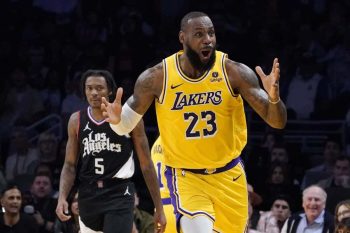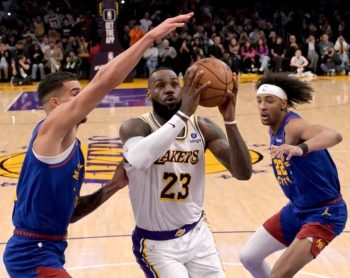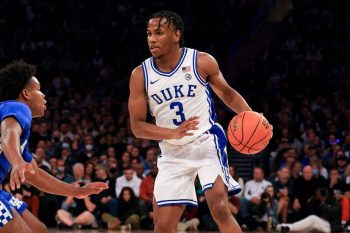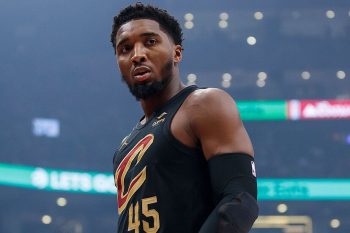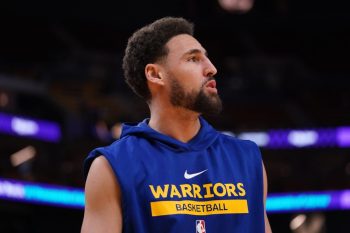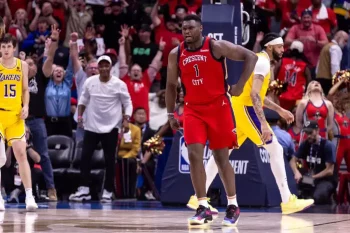NBA
Blame McGrady: Is Irving for Rondo Legal?

Initially, the Cleveland Cavaliers have not taken the NBA by storm, struggling to blend the talents of LeBron James, Kevin Love and Kyrie Irving.
Irving, in particular, as the “point guard” is dishing just 3.8 assists a game through Cleveland’s 1-3 start, including a 34-point, zero-assist effort on Wednesday in a loss to the Utah Jazz.
https://twitter.com/Real_T_Mac/status/530437423147548672
That’s former NBA All-Star Tracy McGrady giving his two cents on the Cavaliers, referring to Boston Celtics point guard Rajon Rondo.
The likelihood that the Cavaliers look to move Irving before the February trade deadline may be slim, but if they did want to part ways with the All-Star guard, it would be an easy affair.
Irving received a five-year extension in July, which won’t kick in until the 2015-16. Under these specific circumstances, Irving’s contract is considered “poison pill,” which imbalances his salary in trade.
As a maximum player, Irving’s exact salary won’t be determined until the 2015-16 salary cap is set. Currently, the league is using a projection salary of $89.1 million over five years. Averaged with his current year at $7.1 million, Irving would count as $16.3 million in coming salary to any team trying to acquire him in trade.
[Update: The NBA’s original projection throughout Irving’s extension rose from a $17.8 million average in July, to the current figure at $18.2 million. Also Irving has a 15% trade kicker in his extension, but a trade bonus has no effect on a player’s contract if they’re making a maximum salary.]
For the Cavaliers, they would be sending out Irving’s $7.1 million base salary — but to an incoming team, they’d need to account for Irving’s salary at the larger figure.
With that in mind, is an Irving-f0r-Rondo swap even legal given Irving’s poison-pill status?
One-for-one, the answer is no.
Rondo is in the final year of his deal at $12.9 million. The most the Cavaliers can take in for Irving is $10.7 million (provided they are able to stay under the luxury tax line of $76.8 million upon completion of a deal).
Cleveland would need to include at least $1.7 million of additional salary going out. Cleveland could package Brendan Haywood (or a combination of players like Lou Amundson and Joe Harris) with Irving to make the numbers work on their end. Amundson cannot be dealt until 12/26/14, as a recently signed free agent.
A two-for-one deal for Rondo, with Irving and Haywood to Boston legally works on the Cleveland side, but is it cap worthy for Boston?
Irving and Haywood combine to make $9.3 million this season, but since Irving is poison pill, the Celtics would be credited with $18.5 million in incoming salary.
Boston has two trade exceptions big enough to take on Haywood, one for Keith Bogans ($5.3 million) and another for Joel Anthony ($3.8 million). The Celtics can also take in up $17.9 million for Rondo (including $5 million in padding), which works for Irving’s poison pill figure (as long as Haywood is acquired separately via trade exception).
Already at the maximum of 15 players, the Celtics would need to clear one roster spot prior to any two-for-one trade. That could be accomplished simply by waiver of a guaranteed player before the trade is executed.
The Cavaliers can take on another player via their Keith Bogans’ trade exception — yes, they have one too. Both teams might be able to avoid using their trade exceptions if Haywood was traded directly for Vitor Faverani — or Cleveland can take on Phil Pressey.
Note that Celtic Dwight Powell cannot be dealt back to the Cavaliers this season, as he was originally sent to Cleveland from Boston last September in the Bogans swap.
Rondo and Pressey for Irving and Haywood, or a number of similar variations, would work — technically.
McGrady may have a point about the Cavaliers, in that Rondo is a true point guard who values setting up his teammates. He’s also an above-average defender with championship experience.
Irving is a fantastic scorer, but that seems to be his priority ahead of play-making; he’s yet to show he can be an asset defensively.
The Cavaliers aren’t likely to bail on Irving this season. If they did, it would be a difficult exercise in cap manipulation, but not an impossible one.
Whether the Celtics or Cavaliers would be willing to trade point guards is specious, but with the right combination of players, it’s legal.
Irving is not the only poison-pill player in the NBA. Others include Klay Thompson (Golden State Warriors), Kemba Walker (Charlotte Hornets), Kenneth Faried (Denver Nuggets), and Ricky Rubio (Minnesota Timberwolves).
